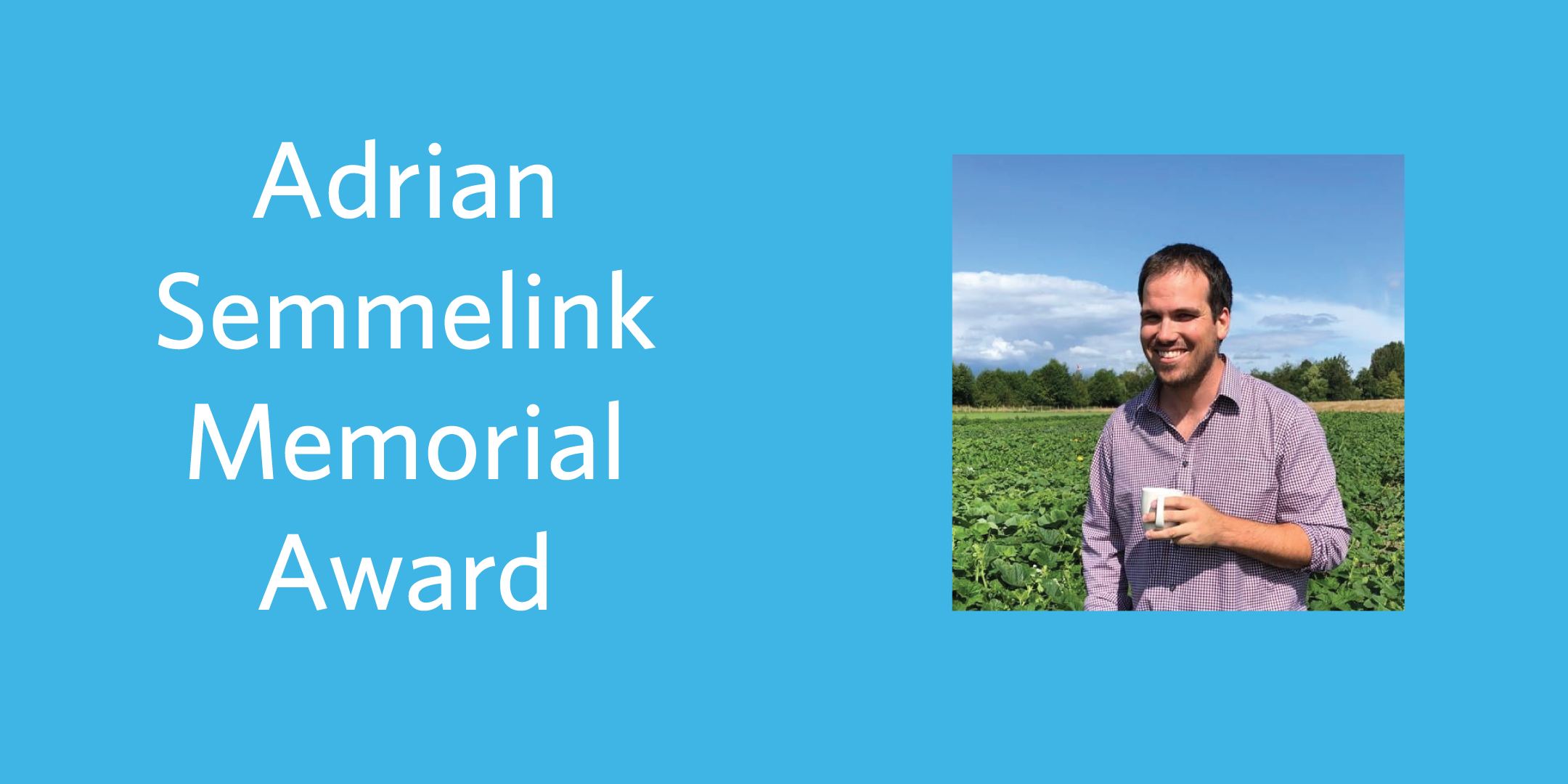
The Adrian Semmelink Memorial Award has been made available annually through gifts from friends and family in memory of Adrian Semmelink (1991-2020) for students in the Resources, Environment and Sustainability (RES) program who are in good academic standing. Preference is given to students whose research focuses on sustainable agriculture. Adrian (B.A. 2015, B.Sc. 2015, M.Sc. 2018) joined the BC Ministry of Agriculture as a New Entrant Agrologist after graduating from the RES program in 2018. His research was interdisciplinary and sought to enable farmers to grow food in socially responsible and ecologically sensitive ways, and to understand what motivates farmers to adopt more sustainable agricultural practices. Adrian was a warm, enthusiastic, empathetic person who seemed to set everyone at ease with his manner and his wonderful sense of humour. He brightened every room he walked in, and touched every person who came to know him. He made the world a better place through his research on sustainable agriculture and farmer practices, and through just being Adrian. The award is made on the recommendation of IRES in consultation with the Faculty of Graduate and Postdoctoral Studies. (First award available for the 2020/2021 winter session).
Recipients:
Read a Q&A with Kat about her research and the award:
In what ways has receiving the Adrian Semmelink Memorial Award influenced your journey this year?
When I learned I had received this award, I was genuinely moved. At the time, I was in the midst of finishing up my PhD. The recognition came at a perfect moment. It not only affirmed the value of my work but also motivated me to keep up the work I was doing. Since I am planning on staying in academia, this award is also extra meaningful as evidence that my work is recognized and appreciated at a broader level.
What message would you like to share with the donors who made this award possible?
Thank you so much for honouring me with this award and for the existence of this award. Awards like the Adrian Semmelink Memorial Award are incredibly important. They support and uplift students who are striving to make a difference, and they remind us that our work is seen and valued by others who share our vision for a better world. It is also really nice that it is within the IRES community, which makes it feel more meaningful.
What aspects of your current research or academic work excite you the most, and why?
I am currently in a phase of transition, as I have just finished up my PhD at IRES. Looking ahead, I am excited to share that I will be starting a job as an Assistant Professor of Biology at Utah Valley University (UVU) in January 2026. At UVU, a primarily undergraduate institution, I look forward to teaching biology, mentoring students, and continuing my research on sustainable agriculture in the Galapagos. I’m especially passionate about providing undergraduate students with meaningful research experiences that can help shape their futures and foster deeper interest in sustainability and conservation.
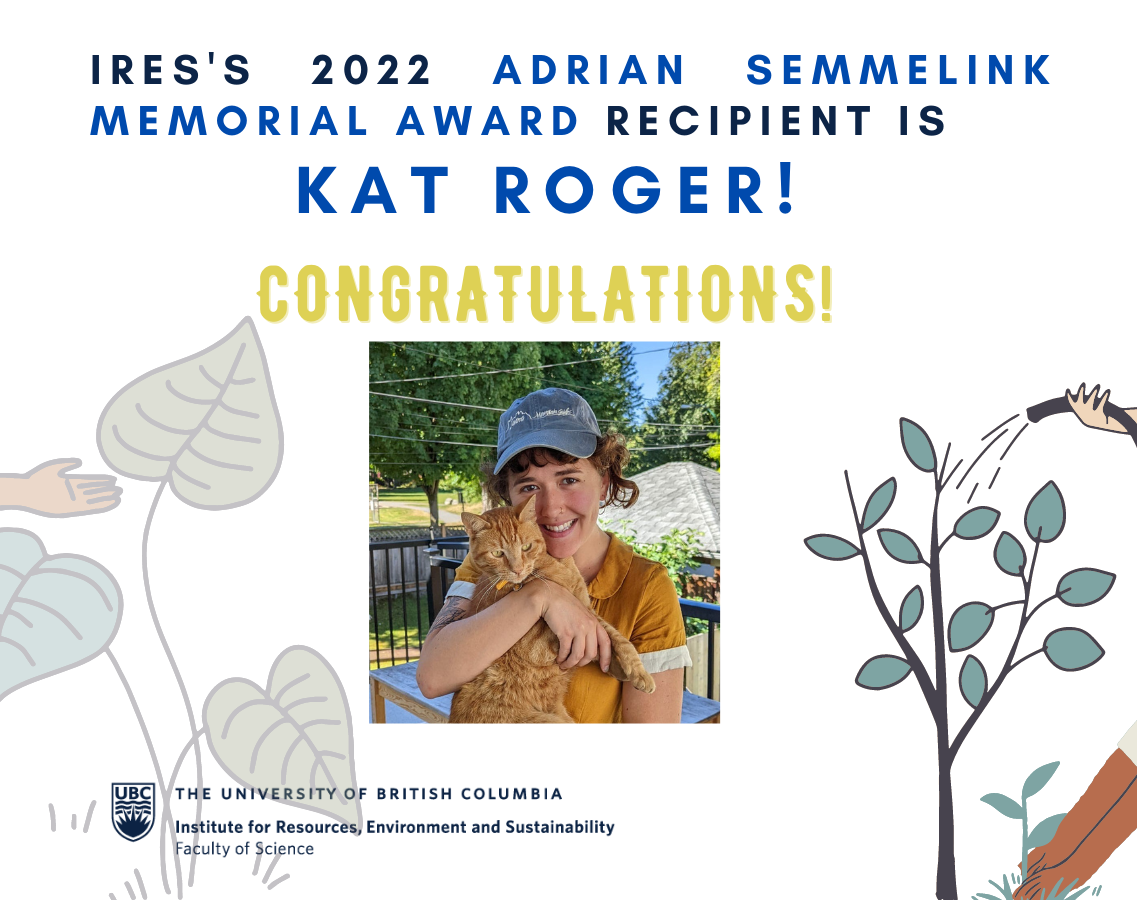
Read a Q&A with Kat about their research and the award:
How has the Adrian Semmelink Memorial Award made a difference to you?
This award will support me in covering costs related to my transition out of my Masters and into working. With the funding from this award, I will be able to work full-time on my thesis in May, including completing community deliverables such as podcasts, web design, and photo and video work for farmer-collaborators in the Ecuadorian Andes.
What would you like to say to the donors?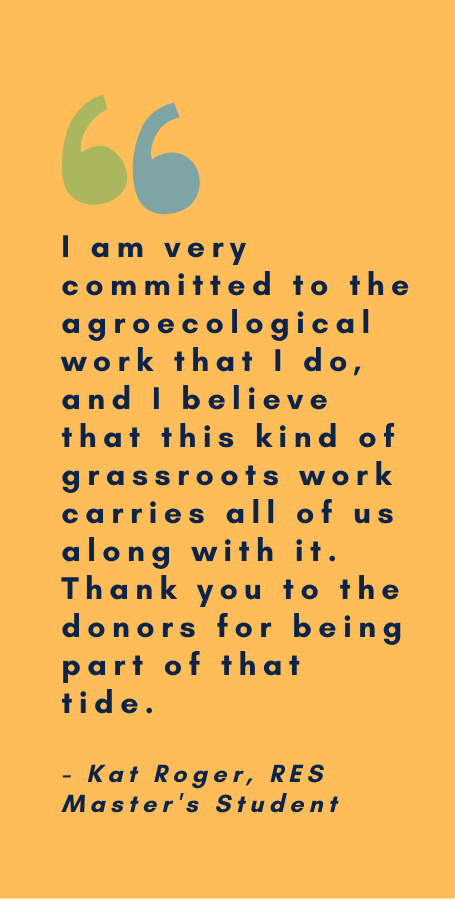
I want to thank you folks for making this award accessible and available; it is wonderful to see people investing in sustainable agriculture. I sincerely hope that my work honors Adrian’s legacy and carries his spirit. I am very committed to and passionate about the agroecological work that I do, and I believe that this kind of grassroots work carries all of us along with it. So, thank you for being part of that tide.
Why did you decide to study resources, environment and sustainability?
I chose to study resources, environment, and sustainability because I want to participate in co-creating the world I dream of for myself, my loved ones, and my descendants. I was drawn to this discipline as a means of developing an intellectual and practical toolkit for developing a more just and vibrant multispecies future. As a scholar, an activist, and an artist, I am compelled by RES’s commitment to interdisciplinary scholarship with practical applications.
Are there any activities (internships, research, volunteering, etc.) you’re involved in?
I work as a teaching and research assistant with the Food Sovereignty Research group— I teach undergraduates, and work as a research and communications coordinator between our group and several farming projects in Latin America. I also act as a board member and executive agricultural committee member for the Foundation for the Islands of Old Providence and Santa Catalina. In this role, I work within my Raizal community to advance agroecology and food sovereignty on our islands. Additionally, I will be starting a position with the Vancouver Farmers’ Market this summer.
Are there any interesting facts about yourself or outside interests that you would like to share?
In my free time, I make jewelry and crafts from natural materials which I sell and trade within my communities.

Read a Q&A with Susanna about her research and the award:
How has this award made a difference to you?
As a graduate student, I find that even small gestures of recognition and financial support go a long way. But this award is something altogether different. I had the pleasure of knowing Adrian Semmelink and experiencing the impact that he had on those around him through his humility, kindness, humour and curiosity. To have been selected for this award for my research on sustainable agriculture is an honour, and bolsters my motivation and drive to continue this work in a way that honours his memory.
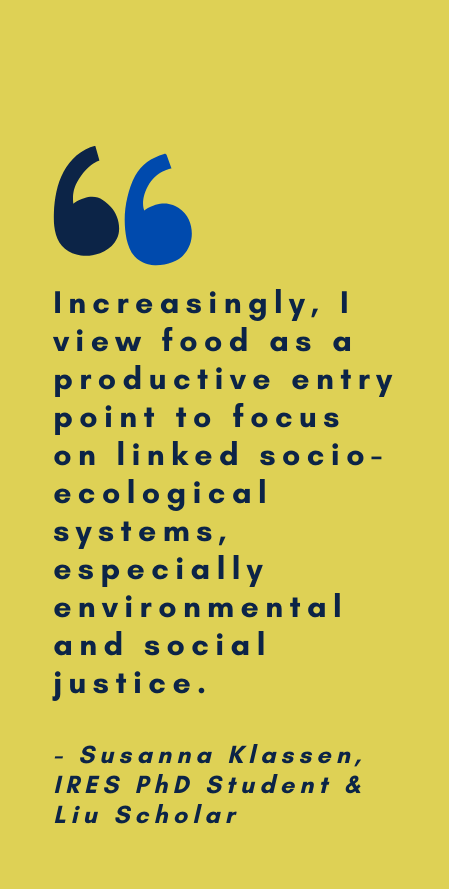
What would you like to say to the Adrian Semmelink Memorial Award donors?
I know Adrian’s family is deeply embedded in the agricultural community in BC, and that shone through in his invaluable research and work with the Ministry. This award will enable me and many other scholars to carry forward Adrian’s legacy of policy-relevant, human-centered research on sustainable agriculture. Thank you for contributing to this award, which will both support and acknowledge the contributions of many scholars for years to come.
How have you been involved in the community (clubs, volunteering, etc.)?
I have had the pleasure of being part of many communities throughout my graduate degrees. For four years I was a director on the board of Food Secure Canada, a non-profit that works towards supporting an equitable and empowered food movement to create a more just, healthy and sustainable food system in Canada. I have been actively involved with the organic community through my PhD research, especially Organic BC. I have also collaborated with Fuerza Migrante, a migrant worker collective working to build migrant power from below, in participatory research. Finally, I am a graduate of Pearson College, a United World College (UWC) on Vancouver Island, and have been involved in the BC chapter of the UWC National Committee of Canada which works to select students to attend UWCs around the world based on leadership potential, active commitment and service to community, and academic achievement.
Why did you decide to pursue studies in sustainable agriculture?
I was initially attracted to the field because of my experiences working and volunteering on farms, and what they taught me about sustainability and systems thinking. Increasingly, I view food as a productive entry point to focus on linked socio-ecological systems, especially environmental and social justice. Food system challenges are rarely about food itself.
What have your studies focused on and what about your research really excites you?
My graduate work has varied in its methods, but has generally focused on social dimensions of sustainability in farming systems. My PhD research is about the policy and practice of certified organic agriculture with a focus on labour, fairness for farmworkers, and ecological diversification. I am excited by the prospect of continuing to evolve my thinking, expand my methodological approaches, and deepen my relationships through research. My research has always been problem-driven, and I find this freedom to build on previous work while branching out in new directions to be a real privilege, and the most exciting aspect of my work.
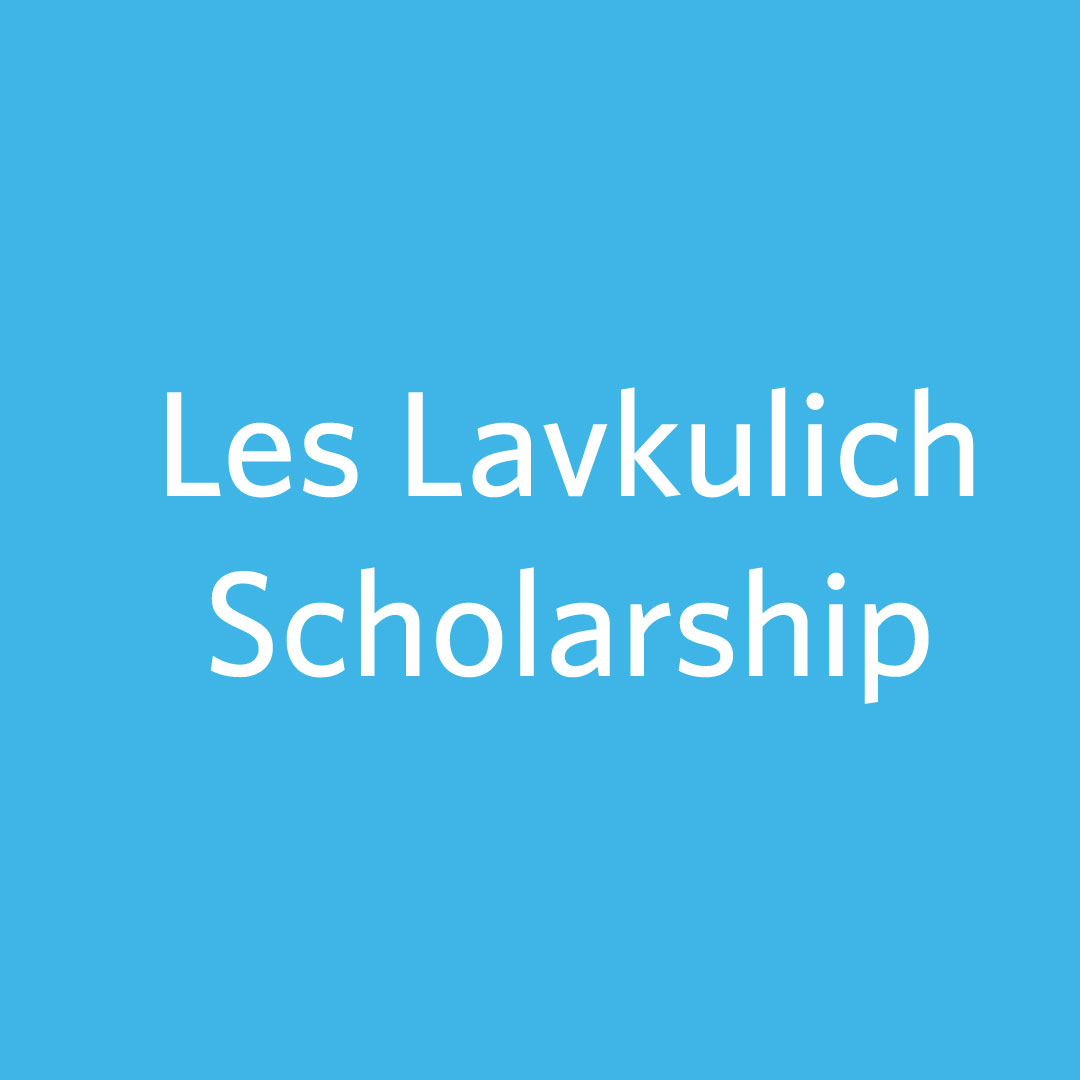
The Les Lavkulich Scholarship for Resource and Environment has been endowed by colleagues, friends and UBC alumni in honor of Professor Les Lavkulich, who created the RES program in 1979, the first truly interdisciplinary graduate program at UBC. As the program’s inspirational leader between 1979 and 2004, he was able, with his unrelenting effort and visionary thinking, to build it into an internationally renowned program.
Recipients:
2024 Jasmine Lambert
2023 Vincent Chireh
2021 Rona MacNicol
2020 Diana Bedolla Lopez
2019 Vikas Menghwani
2018 Brianne Della Savia
2017 Megan Callahan
2016 Simon Harding
2015 Kieran Findlater
2014 John Driscoll
2013 Philamer Torio
2012 Megan Peloso
2012 Lyudmila Rodina
2010 Christian Beaudrie
2009 David Boyd
2009 Conor Reynolds
2008 David Maggs
2007 Jane Lister
2006 Sarah Jane Foster
2024 Caleb Sinn
2023 Rapichan Phurisamban
2021 Mauricio Carvallo Aceves
2020 Sarah Louise Ruder
2018 Krista Forysinski
2017 Lyudmila Rodina
2016 Alejandra Echeverri Ochoa
2015 Paige Olmsted
2014 Lisa Westerhoff
2013 Ghazal Ebrahimi
2012 Gerald Singh

The Freda Pagani Awards have been endowed by family and friends for graduate students in the Resources, Environment and Sustainability graduate program. As founder and director of the Sustainability Office at UBC, Freda helped to develop green building guidelines for campus facilities, initiated an energy management program, created the UBC Social, Ecological, Economic, Development Students Program (SEEDS), and developed a community energy and water plan. In addition, Freda led the creation of the University’s first ecologically friendly building, the C.K. Choi Building.
Recipients:
2023 Emma Gillies
2020 Cam Bullen
2019 Emily Mistick
2018 Theodore Eyster
2017 Elizabeth Williams
2016 Jillian Guerra
2015 Alejandra Echeverri Ochoa
2015 Sameer Shah
2014 Beatrice Simms
2013 Lauren Weatherdon
2012 Sara Elder
2010 Michael Lathuilliere
2023 Yeonuk Kim
2021 Sara Nawaz
2021 Dana James
2020 Sameer Shah
2019 Alejandra Echeverri Ochoa
2018 Poushali Maji
2017 Kieran Findlater
2016 Edward Gregr
2014 Angela Eykelbosh